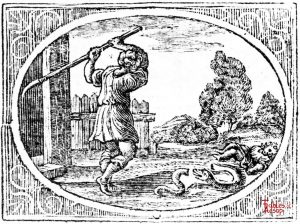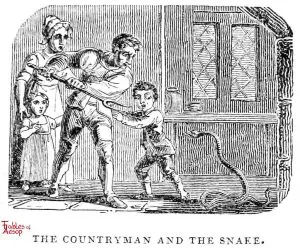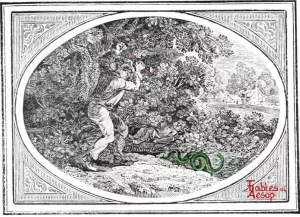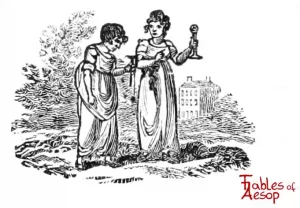A Man’s Son stepped on a Snake who bit and killed him. The Man cut the tail off the Snake which then went after the Man’s Cattle. No truce could be had.
Injuries may be forgiven, but not forgotten.

Eliot/Jacobs Version
A Countryman’s son accidently trod upon a Snake’s tail. The Snake turned and bit him and the son died. The father, in a rage, got his axe, and pursuing the Snake, cut off part of its tail. The Snake, in revenge, began killing the Farmer’s cattle. The Farmer thought it best to make it up with the Snake, and brought food and honey to the mouth of its lair, and said to it: “Let’s forget and forgive; perhaps you were right to punish my son, and take vengeance on my cattle, but surely I was right in trying to revenge him; now that we are both satisfied why should not we be friends again?” “No, no,” said the Snake; “take away your gifts; you can never forget the death of your son, nor I the loss of my tail.”

Townsend version (The Laborer and The Snake)
A snake, having made his hole close to the porch of a cottage, inflicted a mortal bite on the Cottager’s infant son. Grieving over his loss, the Father resolved to kill the Snake. The next day, when it came out of its hole for food, he took up his axe, but by swinging too hastily, missed its head and cut off only the end of its tail. After some time the Cottager, afraid that the Snake would bite him also, endeavored to make peace, and placed some bread and salt in the hole. The Snake, slightly hissing, said: “There can henceforth be no peace between us; for whenever I see you I shall remember the loss of my tail, and whenever you see me you will be thinking of the death of your son.”
Moral
No one truly forgets injuries in the presence of him who caused the injury.

Samuel Croxall (The Serpent and the Man)
A CHILD was playing in a meadow, and by chance trod upon a Serpent. The Serpent, in the fury of his passion, turned up, and bit the child with his poisonous teeth, so that he died immediately. The father of the child, inspired with grief and revenge, took a weapon in his hand, and pursuing the Serpent, before he could get into his hole, struck at him, and lopped off a piece of his tail. The next day, hoping by this stratagem to finish his revenge, he brought to the Serpent’s hole honey, meal, and salt, and desired him to come forth, protesting that he only sought a reconciliation, on both sides, However, he was not able to decoy the Serpent forth, who only hissed from within to this purpose: In vain you attempt a reconciliation; for, as long as the memory of the dead child, and the mangled tail subsists, it will be impossible for you and I to have any charity for each other.
THE APPLICATION
The man who has injured you will never forgive you, is a Spanish proverb, and, after their dry way, a very good one. It seems odd, at first sight, because one would think the backwardness to forgive should be on the side of him who has received the injury; but the truth of the maxim lies, with much more certainty, on the other side. The consciousness of having provoked the resentment of another will dwell so continually upon the mind of the aggressor, that he cannot rest till he has finished his work, and put it as much as possible out of his enemy’s power to make any return upon him. Therefore, as the Serpent wisely observes, it is in vain for two people, who have palpably injured each other, ever to expect to live well together for the future. Morality bids us to forgive our enemies, and the voice of reason confirms the same: but neither reason nor morality bids us enter into a friendship with, or repose a confidence in, those who have injured us. We may resolve not to return ill usage; but ought never to be forgiven, if, when we can prevent it, we put ourselves into our enemy’s hands.

Thomas Bewick (The Serpent and The Man)
A Child was playing in a meadow, and by chance trod upon a Serpent. The Serpent, in the fury of his passion, turned up and bit the Child with his venomous teeth, so that he died immediately. The Father of the Child, inspired with grief and revenge, took a weapon, and pursuing the Serpent, before he could get into his hole, struck at him and lopped off a piece of his tail. The next day, hoping by stratagem to finish his revenge, he brought to the Serpent’s hole honey, and meal, and salt, and desired him to come forth, protesting that he only sought a reconciliation on both sides; but the Serpent answered him with a hiss to this purpose: In vain you attempt a reconciliation; for as long as the memory of the dead Child and the mangled tail subsists, it will be impossible for you and I to have any charity for each other.
APPLICATION.
When persons have carried their differences to an extreme length, it is in vain for them to think of renewing a cordial friendship; for in the heat of their quarrel, many injuries must have been reciprocally offered and received, which must tear asunder the strongest bands of amity. The fury of their dissentions may indeed subside, yet neither party can forgive the wrongs which neither can forget. The consciousness of having provoked the resentment of another, will dwell so continually upon the mind of the aggressor, that he cannot rest till he has finished his work, and put it as much as possible out of his enemy’s power to make any return upon him; and the old proverb will be verified which says, “The man who has injured you, will never forgive you.” Morality bids us forgive our enemies, and the voice of reason confirms the same; but neither reason nor morality bids us enter into a friendship with, or repose a confidence in, those who have injured us, and of whom we have a bad opinion. We may resolve not to return ill-usage; but ought never to put ourselves into the power of an enemy.

JBR Collection (The Serpent and The Man)
The Child of a Cottager was at play in a field at the back of his Father’s house, and by chance trod upon a Snake, which turned round and bit him. The Child died of the bite, and the Father, pursuing the Snake, aimed a blow at him, and cut off a piece of his tail. The Snake gained his hole, and the next day the Man came and laid at the mouth of the hole some honey, meal, and salt, and made offers of peace, thinking to entice the Snake forth and kill him. “It won’t do,” hissed out the Snake.” As long as I miss my tail, and you your Child, there can be no good-will between us.”

L’Estrange version
There was a snake that bedded himself under the threshold of a country-house: a child of the family happen’d to set his foot upon’t; the snake bit him, and he di’d on’t. The father of the child made a blow at the snake, but miss’d his aim, and only left a mark behind him upon the stone where he struck. The countryman offered the snake, some time after this, to be friends again. No, says the snake, so long as you have this flaw upon the stone in your eye, and the death of the child in your thought, there’s no trusting of ye.
Moral
In matter of friendship and trust, we can never be too tender; out yet there’s a great difference betwixt charity and facility. We may hope well in many cases, but let it be without venturing neck, and all upon’t, for new converts are slippery.

Serpens et Filius Rustici
Dicitur quod serpens punxit filium rustici, cingendo, et mortuus est. Venit ergo rusticus et, filium mortuum videns, accepit baculum ut serpentem occideret. Et, cum serpens intraret foramen, percussit eum et abscidit ei caudam. Postea dixit rusticus, “Quod factum est, factum est et factum sit; remitto tibi mortem filii mei. Veni ergo; faciamus pacem.” Respondit serpens, “Donec tu sepulturam filii tui et ego caudam amissam videmus, tunc pacem habere non poterimus.”
Moral
Ita illi, qui patiuntur malum ab aliquo vel faciunt, alter in altero confidere non possunt.
Perry #051



